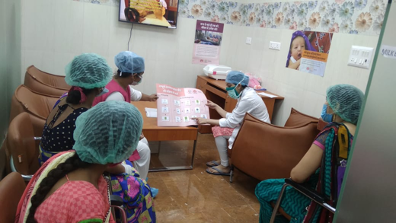Nandini Kumari’s son arrived early. Because of his low birth weight, he was quickly shifted to the neonatal intensive care unit (NICU). The stay in the NICU and the feeding challenges that followed were hard on Nandini and her son. In an all too common story, what could have been a time of joy became a time of great distress.
India is home to roughly 18 percent of the world’s population, but about 33 percent of the world’s preterm births. The high prevalence of preterm births contributes to another alarming statistic—in India, newborns account for more than half all deaths of children under age five.
Though these statistics are grave, WHO estimates that nearly 71 percent of all prematurity-related deaths could be avoided with cost-effective interventions—breastfeeding and human milk banking, kangaroo care with skin to skin contact, and infection detection and treatment. With support from Philips India CSR, PATH is working with government partners in India to expand access to these critical interventions by scaling them across facilities and states.
Lifesaving human milk
With technical support from PATH, the states of Uttar Pradesh and Madhya Pradesh established their first comprehensive lactation management centers, and the states of Maharashtra and Rajasthan each upgraded their lactation centers into regional reference centers that now provide training and accreditation to others.
These achievements ultimately mean better access to lifesaving human milk for newborns in each state—especially preterm deliveries like Nandini’s son.

A mother expressing milk for her own baby at King George Medical University in Lucknow, India. Photo: King George Medical University.
To address the feeding challenges they faced, doctors prescribed donated, pasteurized human milk for Nandini’s son and provided counseling regarding its use. The donated milk helped him gain weight and prevented additional complications, while Nandini received lactation counselling and learned to express her own milk.
“Every hospital should offer this support for mothers and babies,” Nandini says. “I am really thankful to the mothers who have donated milk so other babies can benefit.”

Counseling support given to mothers by health workers at King George Medical University in Lucknow, India. Photo: King George Medical University.
Pushing past the pandemic
The COVID-19 pandemic has disrupted the delivery of essential newborn nutrition and care services in India. Outpatient hospital services have been suspended. Hospital stays shortened. Staff headcounts reduced and more.
All these changes have made it difficult for mothers and families to get the feeding support they need. PATH is working with health facilities across India to help bridge these new gaps and provide lactation support to mothers and newborns. We’re supporting the government as they develop guidance for health workers, sharing best practices for newborn nutrition and care, and providing technical support as lactation management centers adapt to the new normal.
“From March to June of this year, PATH helped the health facilities to provide counselling and breastfeeding support to more than 10,000 mothers and their families,” says Ruchika Sachdeva, Deputy Director of PATH’s MNCHN portfolio in India. “Despite the pandemic’s challenges, we are working to ensure a healthy start for newborns.”



